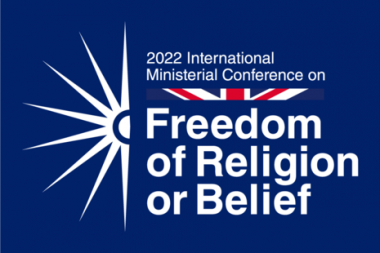The government's ministerial on Freedom of Religion or Belief must be more than a talking shop

The International Ministerial Conference on Freedom of Religion or Belief (FoRB), which takes place in London from 5-6 July, will bring together government representatives and members of civil society from all over the world to discuss pressing global threats to FoRB, and most importantly, how the international community can respond to them.
That latter point is crucial; the Ministerial is a uniquely valuable opportunity which we must seize. The fact that it is taking place at all is proof of the high awareness of FoRB issues on a political level in the world today, but it is not enough for us to spend the next two days just talking. We need to turn that awareness into concrete action that makes a difference in the lives of those around the world who are suffering injustices on account of their religion or belief – whatever those beliefs may be.
One of our hopes for the Ministerial is that more countries will join the International Religious Freedom or Belief Alliance (IRFBA). This Alliance, currently comprising 35 members, four 'friends' and two observers, brings together government representatives from around the world at regular intervals throughout the year to discuss and respond to FoRB crises.
In an era where recalcitrant countries like China and Russia hold such significant economic and geopolitical influence, there is strength in numbers. Joining IRFBA is one way in which members of the international community can coordinate their actions on FoRB issues, rather than lone countries feeling isolated as they stand up to often more dominant global powers.
We would like to see more countries appoint specific individuals to champion the right to FoRB in government policy. Often called Special Envoys, we have one here in the UK, as do several other European countries including the Czech Republic, Denmark, Germany and Italy. These roles are a great way of ensuring that the right to FoRB remains on a government's agenda even among many other competing interests such as trade and development.
Their positions should be made permanent fixtures in any government, and they should receive adequate support, staffing and resources to carry out their vital work. We also hope that the Ministerial will be a reminder of the importance of working together, and will encourage these special envoys to work closely with their international counterparts.
Finally, while we do believe that awareness of FoRB issues is at an all-time high on a political level, there is no reason this could not go further still. We think it is essential that all diplomats, both here in the UK and in the countries whose representatives are attending the Ministerial, are given training on FoRB as part of their diplomatic training. This should include an understanding of what FoRB is, and also what it isn't; how it can be violated, and the manner in which it so often intersects with other fundamental human rights.
These are the steps that we need to take towards the realisation of a world in which everyone is free to believe. Let's not miss this opportunity.
Mervyn Thomas is Founder President of Christian Solidarity Worldwide.











